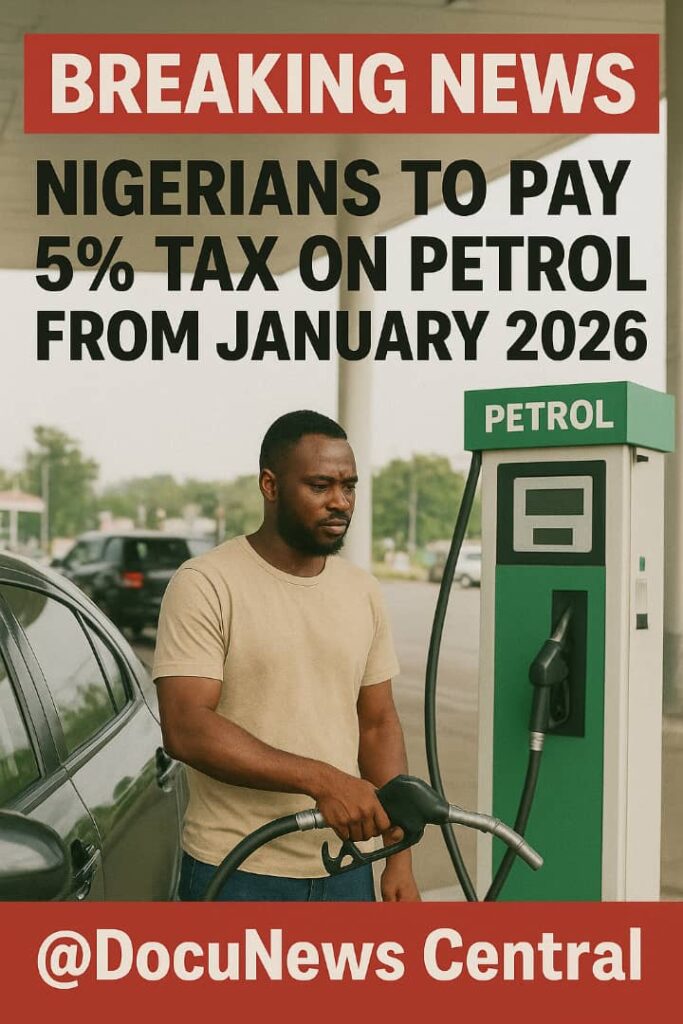
BREAKING NEWS: Nigerians to Pay 5% Tax on Petrol from January 2026
New Law Adds Fuel Surcharge – Nigerians Brace for Higher Pump Costs
🚨 Introduction
A new tax law will soon change the way Nigerians pay for petrol. From January 2026, a 5% surcharge will be added to every litre of petrol and other fossil fuels sold across the country. This policy, approved by the Federal Government, is part of a broader reform aimed at reducing reliance on fossil fuels and encouraging cleaner energy.
The news has sparked heated debates nationwide. Many Nigerians are worried about higher transport fares, increased food prices, and the overall impact on daily living. Others, however, argue that the move is necessary to prepare the country for a future less dependent on oil.
In this report, DocuNews Central takes a deep dive into what this tax really means, why it is being introduced, how it will affect citizens, and what experts are saying about the future of energy in Nigeria.
📌 What is the New Petrol Tax?
The law introduces a 5% surcharge on fossil fuels, including petrol, diesel, and other petroleum products. In simple terms, for every ₦10,000 spent on petrol, Nigerians will now pay an extra ₦500 as tax.
The new tax is not hidden; it will be collected directly at the filling stations when customers buy fuel.
Exemptions:
Kerosene
Cooking gas (LPG)
Compressed Natural Gas (CNG)
Renewable energy products
This means families that use kerosene or gas for cooking will not be affected, and drivers using CNG-powered vehicles will also avoid the surcharge.
📅 When Will It Start?
The Federal Government has announced that the new surcharge will take effect in January 2026. Fuel stations across the country will adjust their pump systems to automatically include the 5% tax when customers buy petrol.
The government has already begun sensitization campaigns to inform citizens about the coming change.
⚖️ Why Is Government Introducing This Tax?
Officials say the surcharge is part of a long-term plan to reduce Nigeria’s heavy dependence on fossil fuels. For decades, Nigeria has relied on petrol and diesel not just for transport, but also for power generation and industry.
The government argues that the world is moving towards cleaner and greener energy, and Nigeria cannot be left behind. This policy is designed to:
- Discourage wasteful fuel use.
- Encourage citizens to explore alternative energy sources like solar, wind, and CNG.
- Raise revenue to support green energy projects.
- Align Nigeria with global climate agreements.
According to the Ministry of Finance, funds from the tax will be used to develop renewable energy projects, support local manufacturing of solar panels, and invest in clean public transport systems.
💬 Public Reactions
News of the 5% petrol tax has spread quickly on social media and in local communities. Nigerians from all walks of life are expressing mixed feelings.
Transport Workers’ Concerns
Commercial bus drivers and motorcycle riders (okada operators) are among the loudest critics. Many fear that the extra cost will force them to increase fares, which will in turn hurt commuters.
Market Traders’ Fears
Food sellers and market traders warn that higher transport costs will push food prices up even further. With inflation already biting hard, many Nigerians fear more hardship.
Civil Society Warnings
Some NGOs have cautioned that the policy could worsen poverty levels if not paired with strong social welfare programs.
Support from Environmentalists
On the other side, climate advocates are praising the government. They see the tax as a bold move to cut carbon emissions and prepare the nation for a cleaner energy future.
🔍 Expert Analysis
Economists say the 5% surcharge is small when compared to fuel prices in other countries. However, because Nigeria has weak infrastructure and high inflation, even a small increase can ripple through the economy.
Economic Experts warn that transport, food, and logistics costs will rise immediately after the tax kicks in.
Energy Analysts point out that Nigeria must invest quickly in CNG stations, solar power, and renewable energy alternatives, or the policy will only create hardship without real benefits.
Climate Experts argue that Nigeria has signed global agreements to cut emissions, and this tax is a step in the right direction.
🛻 Impact on Transport
The transport sector is expected to feel the first impact of the new petrol tax. Nigerians who depend on buses, keke napep, and okadas for daily movement will likely see fare increases.
For instance, if a bus spends ₦20,000 on fuel daily, the 5% tax means an additional ₦1,000 per day in expenses. Most drivers say they will have no choice but to pass the cost to passengers.
This will hit urban workers and students the hardest. Daily commuters already struggling with fare hikes after subsidy removal may now face another round of increases.
🍲 Impact on Food Prices
Food supply depends heavily on transport. Farmers move their goods from rural areas to city markets using trucks that run on diesel or petrol.
With the new tax, transporters are expected to charge more, and traders will adjust prices to recover costs. Items like rice, beans, tomatoes, and yams could see significant price jumps.
For many Nigerians, especially low-income families, this could mean fewer meals or reduced portions. The government is being urged to expand social safety nets such as food aid, cash transfers, and subsidies on agricultural production.
⚡ Impact on Electricity
Many homes and small businesses in Nigeria rely on petrol and diesel generators for power. The new tax means higher generator running costs.
Barbershops, tailoring shops, welding businesses, and other small enterprises that depend on daily fuel use will be forced to raise prices for their services.
This may also affect small schools, clinics, and religious centres that run on generators. Without affordable renewable energy alternatives, many may struggle to survive.
🌍 The Global Context
Nigeria is not the first country to impose taxes on fossil fuels. Many nations around the world already charge similar surcharges to discourage excessive fuel use.
In Europe, petrol taxes are much higher, often above 50% of the pump price.
In the US, states add their own fuel surcharges to fund infrastructure projects.
In Africa, countries like South Africa and Kenya also tax fossil fuel consumption.
Nigeria’s 5% surcharge is therefore seen as moderate by international standards, but its impact could be greater due to weak infrastructure and poverty levels.
💡 What Can Nigerians Do?
Experts recommend that Nigerians prepare for the change by exploring alternatives where possible:
- Switch to CNG-powered vehicles where stations are available.
- Adopt solar energy for homes and small businesses.
- Share transport costs by carpooling or using public transport more often.
- Cut unnecessary fuel use by planning trips efficiently.
🗣️ Voices from the Streets
A Lagos bus driver told DocuNews Central:
“We cannot absorb the cost. Once they add the tax, we must increase fares. Government should remember ordinary people.”
A trader in Kano said:
“Everything depends on transport. If lorries pay more, tomatoes and onions will cost more. We are already suffering.”
A renewable energy expert added:
“This is painful, but it is the right direction. Nigeria cannot depend on petrol forever. We must invest in green energy now.”
📈 What Next?
As the January 2026 deadline approaches, Nigerians are waiting to see how the government will manage the transition. Will renewable energy alternatives be ready? Will citizens get support to cushion the shock?
Government agencies are expected to roll out awareness campaigns and policies to guide the public. Lawmakers are also under pressure to monitor the use of funds generated from the tax to ensure they are spent transparently on clean energy projects.
🙏 Final Thoughts
The 5% petrol tax is one of the boldest policy moves in recent years. For a country where petrol touches every part of daily life, its impact will be wide and deep.
While the aim is noble—to shift Nigeria away from oil addiction—many fear the pain will be immediate while the benefits may take years to show.
As always, DocuNews Central will keep Nigerians informed, updated, and connected with human-centered reporting.
📢 Join the Conversation
This story affects every Nigerian. What do you think about the 5% petrol tax? Will it help Nigeria move to clean energy, or will it only make life harder?
👉 Share your views in the comments section.
👉 Subscribe to DocuNews Central to stay updated on this and other breaking stories.
👉 Follow our official Facebook page: DocuNews Central for real-time updates, photos, and videos.








